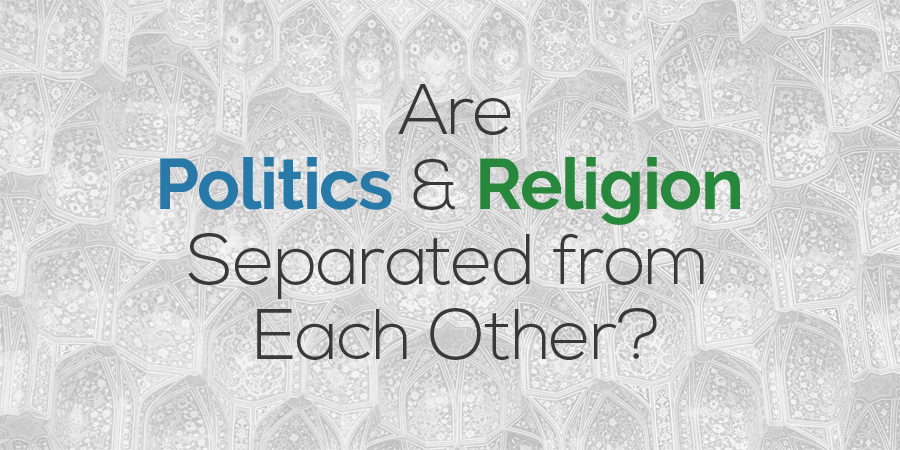Are Politics and Religion Separated from Each Other? (4)

Relationship between Religion and Government
In view of the different forms of government existing in the world, especially the so-called Islamic governments formed during the Islamic period, it cannot be said that Islam has neither a positive nor negative view on the forms of government. If we try to compare the corrupt and oppressive government of Mu‘awiyah1 and Yazid2 with the just government of the Commander of the Faithful (‘a), can we claim that the religion of Islam treats the two equally and does not make any distinction between the government of ‘Ali (‘a) and that of Mu‘awiyah?!
Can it be said that everybody is free to choose any form and system of government he likes, and religion cannot interfere; that the performance of neither the government of ‘Ali (‘a) nor that of Mu‘awiyah has any effect on the ultimate fate of man because the form of government is related to politics and this world and has nothing to do with religion?! Could any reasonable person accept such a contention? Can it be said that the two types of government are equal in the sight of religion and that religion neither recommends nor discourages any of them?
The fact of the matter is that involvement in sociopolitical affairs is among the most evident areas in which religion must get involved. Religion has to explain the appropriate structure of government. Religion has to explain that the ruler has to think about the deprived and the downtrodden as well as about the consolidation of the pillars of his rule from the very beginning of his assumption of office.
Thus, the station of sociopolitical issues in religion, especially in Islam, is clear and eminent. One cannot consider them outside the jurisdiction of religion and believe that they have no effect in the felicity and wretchedness of people. Assuming that the hereafter, the Reckoning, the book of account, reward and punishment really exist, can it be said that the behavior of Mu‘awiyah, Yazid and the like has no effect on them?! Of course, even if some of our Sunni brothers have not yet resolved the issue of Mu‘awiyah’s uprightness, there are many tyrants and oppressors who have blackened the pages of history.
Can it be said that these tyrannical rulers are ideologically on the same footing as the just rulers? Today, are those who are butchering and bombing innocent women and children equal to those who are totally in the service of the deprived and the oppressed, and will live together in paradise? Which religion or nation supports this view? How then can sociopolitical issues be considered as outside the realm of religion? If religion were supposed to give its opinion about reward and punishment, halal and haram, positive and negative values, then sociopolitical issues are the most important issues about which religion must give its opinion.
Based on what has been stated, the scheme on the basis of which religious issues are separate from that of the world and religious issues are just related to God and the hereafter and are outside the realm of worldly affairs, is totally erroneous and inadmissible, and in no way consistent with Islam. The worldview presented by Islam and the life to which it invites us are repugnant to this way of thinking. This is not to mention the fact that those who are uttering such words essentially believe in neither God nor the Day of Resurrection. They are doing so with the aim of expelling religion from the scene. But we have nothing to do with their personal conviction.
Our only point is that separating mundane affairs and temporal issues from the jurisdiction of religion will lead to the denial of Islam and has no other outcome. As we have said, every action contributes to our felicity or wretchedness, as the case may be. So, we have to acknowledge that religion can give its opinion on all matters in our lives and state their ideological value. As the Prophet (s) said:
مَا مِنْ شَىءٍ يقرّبكم إلىٰ الْجَنَّة وَ يباعدكم عَنِ النَّار إلاَّ وَقَدْ أمرتكم به و مَا مِنْ شَىءٍ يقرّبكم مِنَ النَّار وَ يباعدكم من الْجَنَّة إلاَّ وَقَدْ نَهَيْتَكُم عَنْهُ.
“There is nothing that would draw you toward paradise and keep you away from hell except that I commanded you and there is nothing that would draw you toward hell and keep you away from paradise except that I prohibited you.”3
In the Islamic perspective, felicity without paradise has no meaning and wretchedness without being thrown into hellfire simply does not exist:
﴿فَأَمَّا الَّذِينَ شَقُواْ فَفِي النَّارِ… وَأَمَّا الَّذِينَ سُعِدُواْ فَفِي الْجَنَّةِ﴾
“As for the wretched, they shall be in the Fire… And as for the happy, they shall be in Paradise.”4
Universality of Religion
In view of the statement of the Prophet (s), the other assumption is refuted, and to say that it is true that religion can state the value of actions and say what is halal and haram but it was the Prophet (s) himself who stated the values of some actions while some were delegated to the people, i.e., he stated whatever was related to his own time, delegating the rest to the people to identify what is halal and what is haram according to the circumstances of their time.
This statement means that the Prophet (s) did not state all that would give us felicity. This is what he said: “There is nothing that will ensure your felicity except that I have stated it.” Of course, this statement does not mean that he has stated all the minute details. He has rather stated the general rulings, so that, in all times after him, those who have authority can deduce from them specific laws; what is halal and haram according to the evidence, and present them as primary and secondary rulings or government decrees.
Undoubtedly, to identify the specific laws and evidence, which is called religious edict [fatwa’], is in accordance with the general principles mentioned in the Qur’an, the Sunnah of the Messenger of Allah (s) and sayings of the infallible Imams (‘a).
Muhammad Taqi Misbah Yazdi Written by
Mansoor L. Limba Translated by
References:
- Mu‘awiyah ibn Abi Sufyan was the first caliph of the Umayyad dynasty (40 AH/662 CE), which ruled the Muslim world after the martyrdom of the Commander of the Faithful, ‘Ali ibn Abi Talib and the five-month rule of the second Imam, Hasan ibn ‘Ali (‘a). As the founder of the Umayyad dynasty, Mu‘awiyah revived hereditary monarchy and aristocracy in sharp contrast and opposition to the rudimentary precepts of Islam. [Trans.]
- Yazid ibn Mu‘awiyah (26-62 AH) succeeded his father to occupy the office of the caliphate in the year 60 AH. He was a young man devoid of knowledge and virtues and was well known for his debauchery and other vices. Yazid ruled for three and a half years. During his first year he killed Imam al-Husayn (‘a) and his votaries at Karbala’ and made the latter’s surviving kith and kin captives. In his second year as Caliph, he ransacked Medina (the seat of the Prophet’s rule and his burial site), and in his third year of rule he invaded Mecca. [Trans.]
- Bihar al-Anwar, vol. 70, p. 96.
- Surah Hud 11:106, 108.


